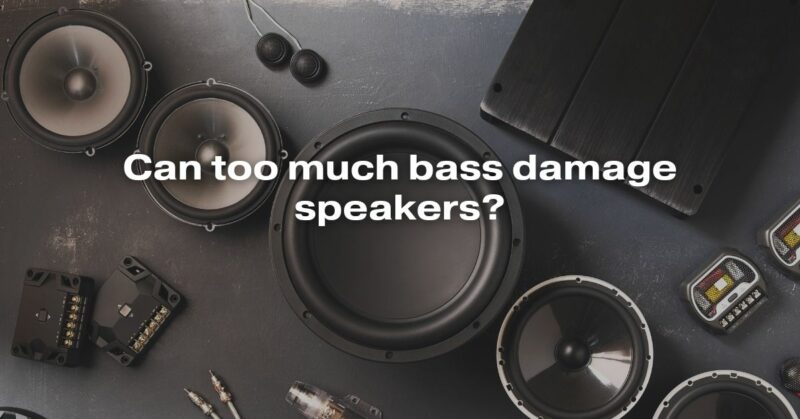Speakers are essential components of any audio system, responsible for translating electrical signals into sound waves that we can hear and enjoy. Among the many factors that can impact a speaker’s performance and longevity, the amount of bass it produces is a critical consideration. Bass is the low-frequency component of audio, and while many people love the rumbling, powerful sensation it adds to music and movies, there is a lingering question: Can too much bass damage speakers? In this comprehensive guide, we will explore the relationship between excessive bass and speaker damage, as well as provide tips on how to enjoy your bass-heavy audio without harming your speakers.
Understanding the Basics of Speaker Design
Before diving into the impact of excessive bass on speakers, it’s important to understand the fundamental components of a speaker and how they interact:
- Diaphragm (Cone): The diaphragm or cone is the part of the speaker responsible for moving back and forth to create sound waves. It is usually made of lightweight materials like paper, plastic, or metal.
- Voice Coil: The voice coil is a wire coil that attaches to the diaphragm. It sits within a magnetic field generated by the speaker’s magnet. When an electrical current flows through the voice coil, it interacts with the magnetic field, causing the diaphragm to move.
- Magnet: The magnet creates the magnetic field that interacts with the voice coil. The strength of the magnet plays a significant role in a speaker’s performance.
- Suspension System: The suspension system (spider and surround) helps to center and support the diaphragm, allowing it to move smoothly.
- Basket (Frame): The basket holds all the speaker components together and provides structural support.
Now, let’s explore how excessive bass affects these components.
The Impact of Excessive Bass on Speakers
While bass is an integral part of audio reproduction, excessive or prolonged exposure to very low frequencies can potentially harm your speakers in various ways:
- Overexcursion: When a speaker attempts to reproduce bass frequencies that are too low and too loud for its design, the diaphragm can move excessively. This overexcursion can cause physical damage to the diaphragm, leading to tears or deformation.
- Heat Generation: High bass levels can result in increased heat production within the voice coil due to the continuous movement of the diaphragm. If the voice coil overheats, it can become damaged or even melt, rendering the speaker inoperative.
- Excessive Vibration: The powerful vibrations generated by excessive bass can loosen speaker components, such as screws and wiring connections. Loose components can impact the speaker’s performance and longevity.
- Clipping and Distortion: When a speaker is pushed beyond its limits, it can introduce clipping and distortion into the audio signal. This not only affects sound quality but can also place additional stress on the speaker components.
- Amplifier Overload: Excessive bass can overload the amplifier driving the speakers. An overworked amplifier may deliver distorted signals, which can be harmful to both the amplifier and the speakers.
Protecting Your Speakers
Now that we understand the potential risks associated with too much bass, here are some steps you can take to protect your speakers while still enjoying deep, powerful low-end frequencies:
- Choose the Right Speakers: Invest in speakers that are designed to handle the level of bass you desire. Look for specifications like power handling, frequency response, and sensitivity to ensure they can handle the bass you plan to send their way.
- Use a Subwoofer: Consider using a dedicated subwoofer for reproducing bass frequencies. Subwoofers are designed to handle low frequencies efficiently, taking some of the strain off your main speakers.
- Set Proper Crossover Frequencies: If you have a subwoofer, configure your audio system to use an appropriate crossover frequency. This ensures that the main speakers are not burdened with reproducing extremely low frequencies.
- Monitor Volume Levels: Be cautious of excessively high volume levels, especially when listening to bass-heavy music. Prolonged exposure to high volumes can damage both your speakers and your hearing.
- Use a High-Pass Filter: Implement a high-pass filter in your audio system to prevent extremely low frequencies from reaching your main speakers. This can help protect them from damage.
- Regular Maintenance: Periodically inspect your speakers for loose components or visible damage. Tighten any loose screws, and if you notice any damage to the diaphragm or voice coil, consider professional repair or replacement.
Conclusion
In conclusion, while enjoying deep, powerful bass is a fundamental part of the audio experience, it’s crucial to strike a balance to prevent damage to your speakers. Excessive bass can lead to overexcursion, heat generation, vibration-related issues, clipping, and amplifier overload, all of which can reduce the lifespan of your speakers and degrade audio quality.
By choosing speakers designed to handle the bass you desire, using subwoofers, setting proper crossover frequencies, monitoring volume levels, and performing regular maintenance, you can enjoy your bass-heavy audio without the fear of damaging your speakers. Remember that a well-maintained audio system will not only provide a better listening experience but also extend the life of your speakers, ensuring that your investment continues to deliver high-quality sound for years to come.


